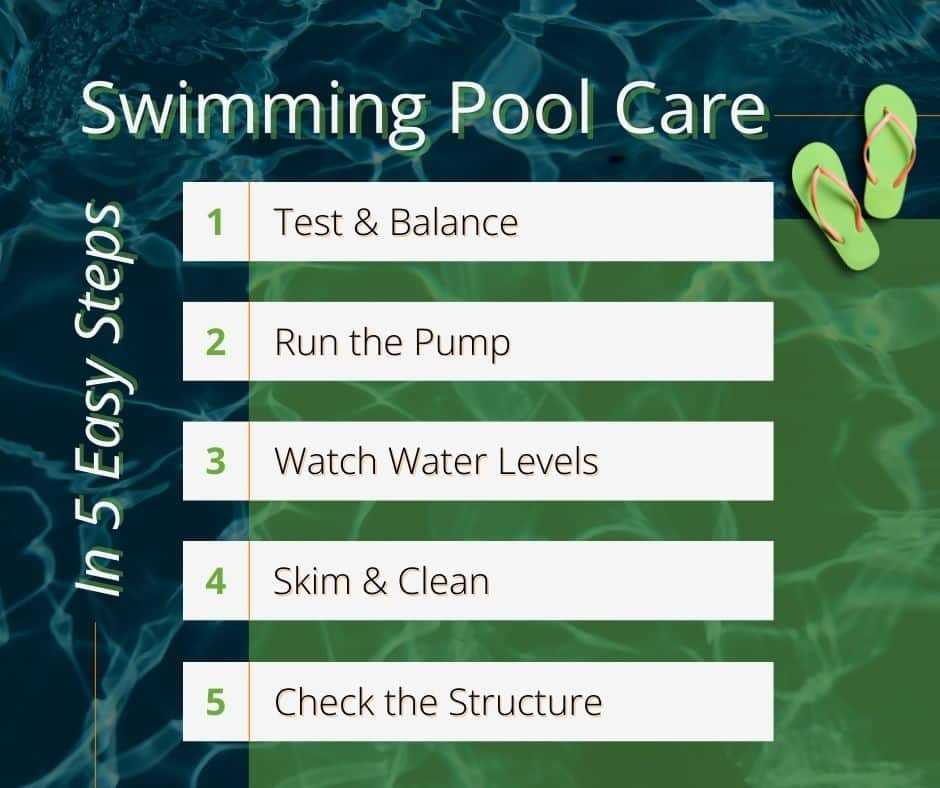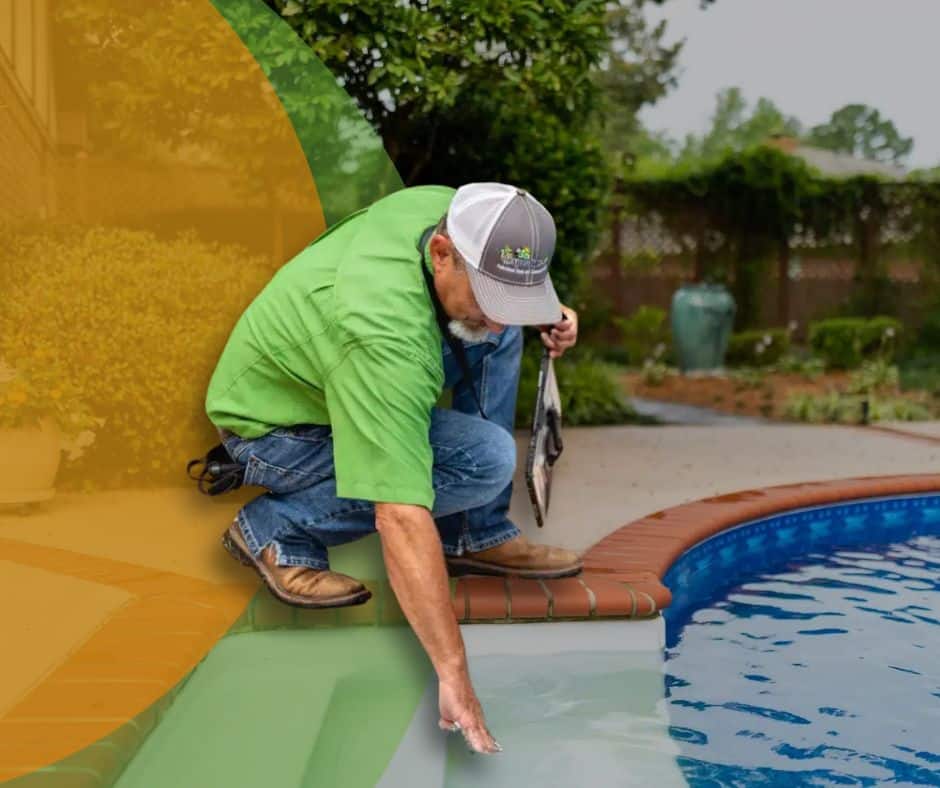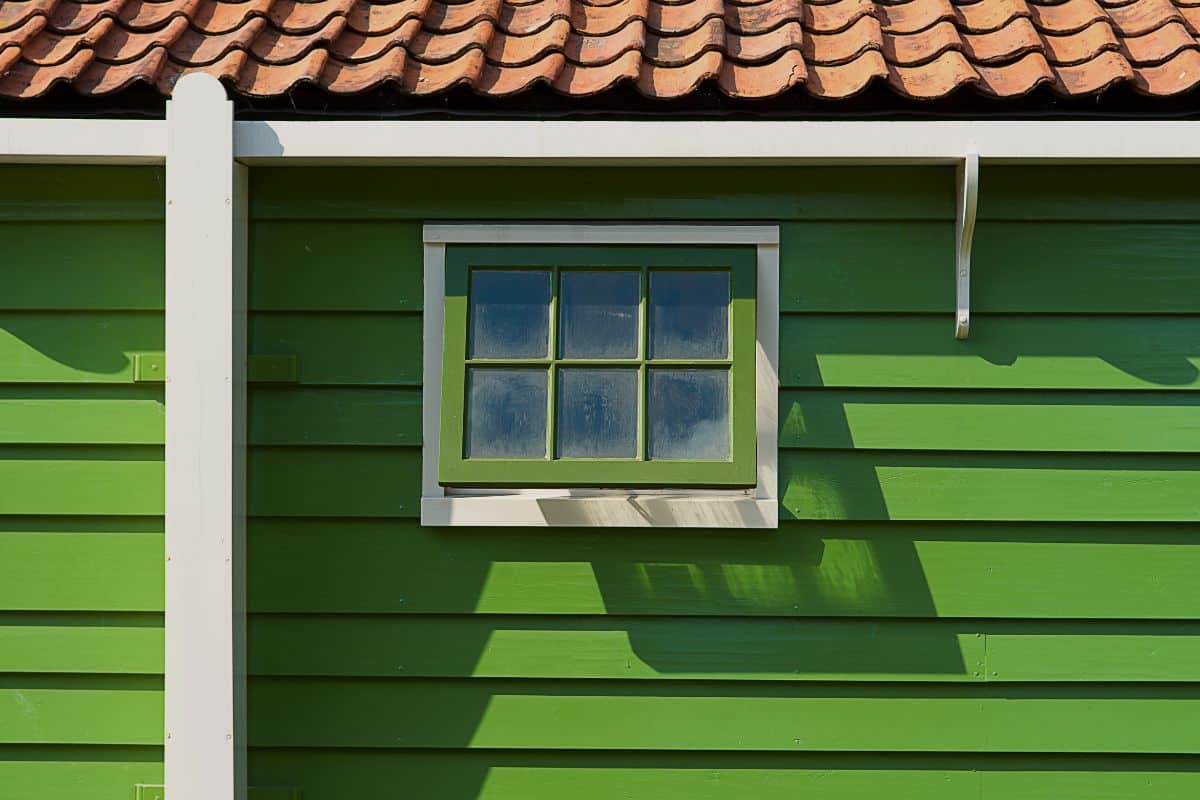In this guide, we’ll walk through the most common swimming pool upkeep mistakes and show you how to keep your water clean, your structure sound, and your summer stress-free.
A backyard pool is a great way to beat the heat in the south. But if you skip the basics, small issues can turn into costly repairs fast. Whether you’ve had your pool for years or are preparing to sell your home, staying ahead of pool maintenance pays off.
From green water to cracked plaster, most expensive repairs start with routine upkeep mistakes. The good news is that nearly all of them are preventable with a simple checklist.
Table of Contents
ToggleMistake 1: Ignoring Water Chemistry
Even clean-looking water can be unbalanced. If your pH, alkalinity, or chlorine levels are off, you’re asking for cloudy water, algae growth, or even skin and eye irritation.
The CDC recommends keeping chlorine between 1 and 3 parts per million and pH between 7.2 and 7.8 for safe swimming.
What to do instead:
- Test water at least 2 to 3 times per week
- Use test strips or a drop test kit
- Adjust chemicals as needed (don’t guess)
- Shock your pool after heavy use or storms
Consistent testing prevents issues before they turn into green water or costly cleanups.

Mistake 2: Running the Pump Too Little
Many homeowners try to save money on swimming pool upkeep by running their pump just a couple of hours a day. But circulating the water is what keeps debris filtered and chemicals evenly distributed.
Stagnant water breeds algae and bacteria. And if your pool isn’t getting enough turnover, all that effort with testing and chemicals may not work.
What to do instead:
- Run the pump for 8 to 12 hours a day during swim season
- Make sure water flows through the filter properly
- Clean or replace your filter cartridge as recommended
Think of the pump as the heart of the pool. If it’s not moving, the rest of the system can’t do its job.
Mistake 3: Letting Water Levels Drop Too Low
Consistent water levels are critical to proper swimming pool upkeep. If the water line drops below the skimmer, the pump may suck in air, which can damage the motor or the filter.
Water loss can happen slowly from evaporation or quickly from splashing or backwashing. If the level stays too low, it can strain the pump, expose the skimmer, or damage the plaster surface over time.
What to do instead:
- Check water levels at least once a week
- Keep water at the mid-skimmer level
- Refill during hot or windy weeks to prevent material wear
This small habit helps extend the life of your pool’s equipment and structure.
Mistake 4: Skipping Pre-Swim Cleaning
Sunscreen, body oils, dirt, and grass all end up in the water. If swimmers jump in without rinsing off first, your filter has to work overtime, and your chlorine gets used up faster.
Over time, this can lead to cloudy water, slimy walls, and filter clogs.
What to do instead:
- Encourage swimmers to rinse off before jumping in
- Keep a hose or outdoor shower near the pool if possible
- Clean the pool floor and walls weekly with a vacuum or brush
Keeping debris out is easier than trying to clean it up later.
Mistake 5: Letting Debris Sit Too Long
Leaves, bugs, and dirt don’t just look bad. They mess with your pool’s chemistry. As organic material breaks down in the water, it feeds algae and throws off your pH balance.
This can also clog filters, stain pavers, and increase the amount of chlorine you need to keep things clean.
What to do instead:
- Use a skimmer net daily, especially during windy weeks
- Cover your pool when not in use
- Check corners and behind ladders where debris collects
Regular cleaning keeps water balanced and saves money on chemicals.
Mistake 6: Not Winterizing Properly
Texarkana may not see harsh winters every year, but freezing temperatures still happen. If you don’t winterize your pool the right way, pipes can crack, plaster can peel, and algae can grow unchecked under the cover.
Damage during the off-season is one of the top causes of expensive early repairs for backyard pools.
What to do instead:
- Balance the water chemistry before closing
- Lower the water level below the skimmer
- Disconnect hoses and drain the pump and filter
- Use an air pillow and a winter pool cover
Winter prep helps your pool open faster and cleaner next spring.

Mistake 7: Forgetting to Inspect the Pool Structure
Swimming pools may be made of gunite, fiberglass, or vinyl, but they all need regular checks. Over time, UV damage, shifting soil, or water pressure can cause cracks or surface wear.
If you only focus on the water, you might miss signs that the pool structure is starting to fail until it’s too late.
What to do instead:
- Balance the water chemistry before closing
- Lower the water level if needed
- Disconnect and drain the pump and filter
- Use a winter pool cover that fits securely
Catching a weak spot early can prevent a pool wall collapse or injury.
Related Questions
What’s the best way to store pool chemicals safely?
Keep chemicals in a cool, dry place away from direct sunlight. Store them in original containers and off the ground to prevent leaks. Never mix different types.
Do I need a pool inspection if I’m selling my house?
It’s a good idea. Inspection Gator checks pool safety, structure, and equipment performance to help avoid last-minute surprises during the sale.
What if I smell a strong chlorine scent?
Ironically, strong chlorine smells often mean the water is dirty. Chloramines, which form when chlorine binds to contaminants, cause that odor. Shocking the pool helps remove them.
When to Call a Professional
If you’re struggling to balance your pool, dealing with cloudy water, or unsure whether your equipment is working properly, it may be time for a professional checkup.
Inspection Gator offers pool inspections on the structure and pool pump. Whether you’re preparing for summer, wrapping up for winter, or just trying to avoid costly mistakes, our team can help you spot what others miss.
Final Thoughts
Swimming pool upkeep doesn’t have to be complicated. Most problems start with small oversights like skipping water tests, letting debris sit too long, or ignoring cracks.
With the right habits and a little help when needed, your pool can stay safe, clean, and fun all season long.
Ready for your next inspection? Book with Inspection Gator today and keep your pool in shape before problems float to the surface.




